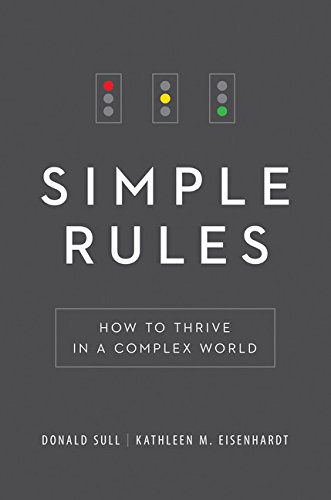HOW SIMPLICITY TRUMPS COMPLEXITY IN NATURE, BUSINESS, AND LIFE
Complexity surrounds us. We have too much email, juggle multiple remotes, and hack through thickets of regulations from phone contracts to health plans. But complexity isn’t destiny. Sull and Eisenhardt argue there’s a better way. By developing a few simple yet effective rules, people can best even the most complex problems.
In Simple Rules, Sull and Eisenhardt masterfully challenge how we think about complexity and offer a new lens on how to cope. They take us on a surprising tour of what simple rules are, where they come from, and why they work. The authors illustrate the six kinds o f rules that really matter - for helping artists find creativity and the Federal Reserve set interest rates, for keeping birds on track and Zipcar members organized, and for how insomniacs can sleep and mountain climbers stay safe.
Drawing on rigorous research and riveting stories, the authors ingeniously find insights in unexpected places, from the way Tina Fey codified her experience at Saturday Night Live into rules for producing 30 Rock (rule five: never tell a crazy person he’s crazy) to burglars’ rules for robbery (“avoid houses with a car parked outside”) to Japanese engineers mimicking the rules of slime molds to optimize Tokyo’s rail system. The authors offer fresh information and practical tips on fixing old rules and learning new ones.
Whether you’re struggling with information overload, pursuing opportunities with limited resources, or just trying to change your bad habits, Simple Rules provides powerful insight into how and why simplicity tames complexity.
The useful thread through this book is that the path towards understanding almost always leads us first through complexity. Indeed, it seems that the more we learn, the more complicated things become. But stick to it. Good science is hard. But good science simplifies. Good rules are simple rules. Clayton Christensen, professor, Harvard Business School
At last, a book offering an ingenious way to fight back against the relentless assault of complexity and its insidious spawning of untold confusions, costs, crashes, and calamities. Simple Rules offers an exciting framework for both understanding complexity and rendering it harmless. Whether you run an organization or are simply trying to survive modern life, this book is gold. Chris Anderson, TED curator
Simple Rules shows how a handful of thoughtful principles can not only sharpen the quality of your decisions, but also allow you to maintain latitude in your judgments and to see the richness of opportunity. We all deal with complexity now, and this book will show you how you can do more with less. Michael J. Mauboussin, head of global financial strategies, Credit Suisse
Our future will be increasingly complex, from accelerating technological change to global connectivity of federated teams. Simple Rules explains how we can manage to make meaningful progress in a world that exceeds human understanding. At DFJ, we use simple rules like invest in unique ideas to support breakout winners across multiple industries undergoing profound disruption. This is a harbinger of the information economy to come. Steve Jurvetson, managing director of Draper Fisher Jurvetson
Sull and Eisenhardt have written the definitive playbook injecting sanity, creativity, and productivity into our workplaces and the other spheres of our lives. Simple Rules is brimming with clever and surprising tips, lovely stories, and compelling research that will help you spot unnecessary complexity, eliminate maddening frustration, make the right decisions faster, and have a whole lot more fun along way. Robert I. Sutton, best-selling author of The No Asshole Rule and coauthor of Scaling Up Excellence
